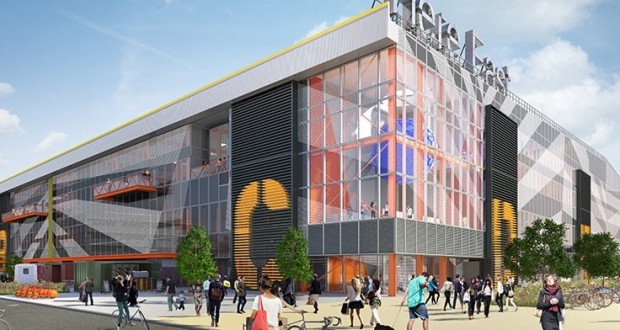There’s not much space to expand in central London – which is presumably why the University of Central London (UCL) is spilling over into East London to the point where it will soon be the region’s fifth university. Is there anything in it for us? That’s a hard question to answer: let’s take it in two parts (just as UCL has done).
First, two of UCL’s faculties (the Built Environment, known as “The Bartlett”, and Engineering) are to move to the Here East part of the Queen Elizabeth Park early next year. Hear East is being developed as a place where innovative businesses, particularly those with a technological and creative slant, can work. It’s good to see jobs coming into the area, but so far we haven’t heard much detail about the links and programmes which will help local people access those jobs.
UCL will be occupying “3,000 square metres of 10 metres high studio space” at Here East and it hopes the new facilities will help its research in areas such as architecture, infrastructure, transport, robotics, healthcare, manufacturing and environmental measurement as well as its teaching side. The space will allow it to combine engineering and design & technology with creative and innovative thinking, which has the potential of boosting the ailing UK manufacturing sector – but not necessarily in terms of the sector becoming a mass employer.
However, some of the research could bring real benefits. UCL’s Professor Stuart Robson points out that the new space will help robotics reseach, which includes “advanced IVF and surgical methods at the very small and human scales”. As long as the NHS remains in public hands, that will be a good investment of public money. It will be less welcome if this kind of research is bought up by the private sector and its use therefore limited by ability to pay.
The faculties’ move to Stratford is being planned at the same time as it has been announced that UCL’s School of Management postgraduate programme is to move to the Canary Wharf tower, as part of a reorganisation of UCL’s teaching of business, management and related disciplines. Teachers and students will be able to draw on the resources of Canary Wharf, including a wide range of mentoring and support programmes and “a strong growth environment” (who knew there was one of those at Canary Wharf?). Students will be onsite from September next year. Canary Wharf houses a great deal of the financial institutions which managed to crash most of the global economy in 2008: let’s hope they’ve learned their lessons before the students learn theirs.
[Adverts]
 East London News A Force for the community…
East London News A Force for the community…




